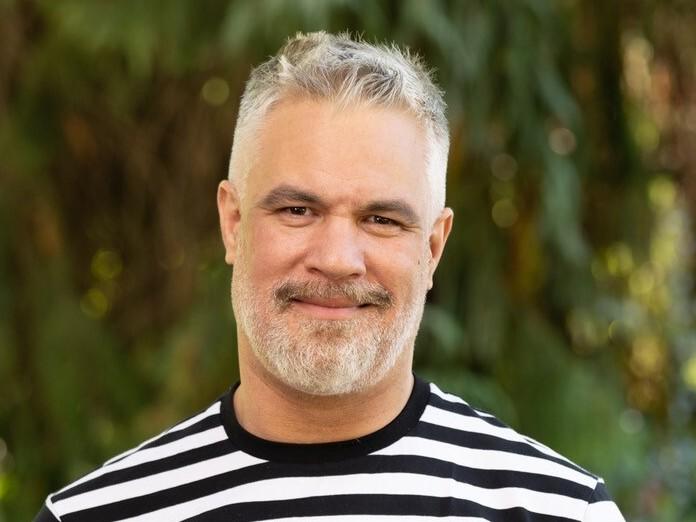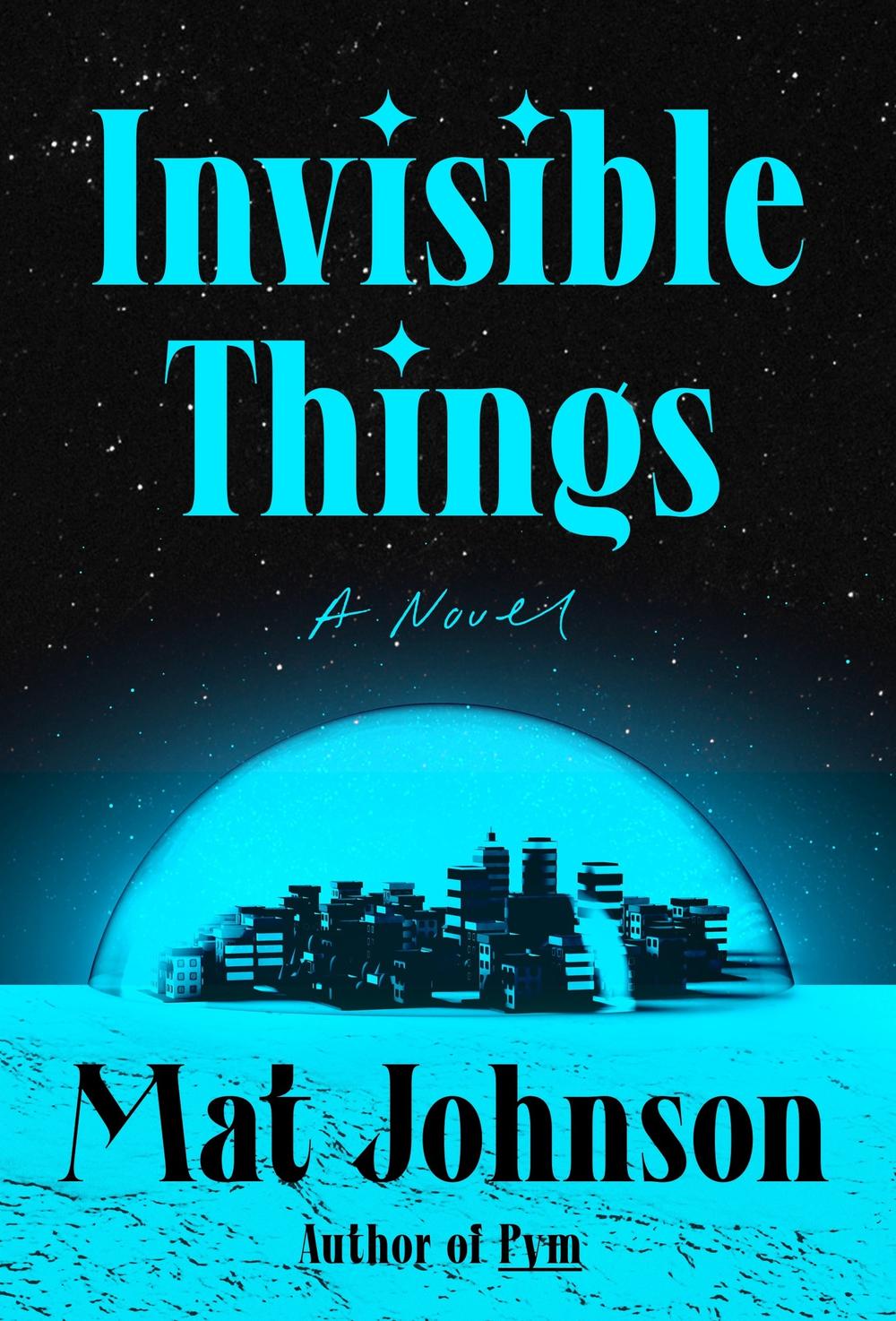Section Branding
Header Content
Real life or satire? Novelist Mat Johnson says it can be hard to tell the difference
Primary Content
Novelist Mat Johnson believes that America has its own unique "flavor" of apocalypse. "It's hard not seeing the possible end of things in a variety of different ways," he says.
Johnson's new satirical novel, Invisible Things, serves up one of those apocalyptic flavors. Set in the future, the novel takes place on one of Jupiter's many moons, where humans have created an artificial ecosystem designed to replicate life on Earth. But they've also copied some of the worst aspects of America's class system and politics. Partisanship reigns, and the privileged — namely, those who arrived in the domed colony first — are favored.
Johnson says the book's satire was inspired, in part, by the intense emotions he experienced throughout the Trump presidency. But, he adds, the political rollercoaster of the past few years — and the normalization of extreme positions — complicated his vision of a dystopian future.
"We're basically living in a satire," he says. "It was very hard to twist things further along, to come up with something that gives you enough distance to say, 'Hey, this is crazy.' "
Interview highlights
On mass denialism in America
We have a nation that was formed in part on a genocide, a land grab and forced generational slavery. We don't have a choice but to acknowledge that. It's been wild watching people react to the 1619 Project because ... the real criticism that you hear behind these very petty disagreements about historical events is that we can't accept this reality as being the source of our nation, that we can't have an America that's not based on our ideals, but based on how we formed it in the first place.
I can't deal with the world that I'm finding myself in without acknowledging that a lot of our existing prejudices. Our entire identity, is based, in part, on the way that we formed, even the issue of mass denialism. I'm scared sometimes that part of the reason that Americans are so good at pretending that what's happening is not happening is a combination of a history of doing this — of being a nation that forms ... [out] of the idea of freedom while also [having] tens of thousands of people being slaves and then also being wealthy enough to get away with it for a very long time. And that's kind of what I fear we're hitting the wall about.
On feeling pressure to push through his own frustrations because of what his ancestors endured
There's so many times when things get really dark, whether it's on a personal or societal level, the impulse is just to give up. And I think about that when I want to give up in different ways. Like, what I'm enduring is nothing compared to what my African ancestors endured, just in the sail from West Africa to the States, just that part alone, in addition to the 100 years of violent oppression and sexual assault.
And then on my white side and the Irish side, they came here from a place where they're being starved to death. And they managed to just come out of incredibly bleak circumstances and make it across the sea and live in poverty for a couple of generations. And thank God for the GI Bill. ...
I think putting it in that context is sometimes the only thing I can do that forces me to put my own frustrations and my own feelings of nihilism in perspective, because there's an incredible strength in that, that people who endured the worst possible things that we can imagine ... were able to have enough hope. Because that's what it is — hope that tomorrow would be better. We're talking about people whose kids were enslaved from the moment they came out of the womb. But they still had enough faith and hope that things could get better. And if they can do it, it seems insulting and disrespectful to their legacy if I don't try to do that.
On growing up knowing his great-grandfather escaped lynching
I remember one of my most vivid recurring nightmares [as a kid] was that I was in the living room with a family that was mine, even though I didn't recognize them. And everyone was being quiet and staring at each other in total fear as the door knob was being turned and the door was locked, but we could hear it clicking if someone tried to open it. And I guess the person I imagined to be my ancestor was sitting on a Archie Bunker-style chair with a shotgun on his lap staring at the door. I don't know if that ever literally happened, but it definitely 100% figuratively happened. [My mother's] grandfather ran away from a lynching. [There was] a fight over a mule and some rifles. And next thing you know, his entire life was changed. Having that kind of trauma there, some people think that's genetic and some say it's just something you learn from your parents. But it was present and the feeling that everything could go south any minute.
On his late mother's long decline with multiple sclerosis and cancer
It's so hard watching somebody you love deteriorate over a slow period of time. ... I've been very fortunate to have a really fun career, both as a writer and as a teacher. But as all this has been happening, I've had this other part of my life, which has been about trying to keep my mother upright as new things kept collapsing beneath her. So it's really weird for me not to have that at this point. It's been two months [since she died] and I really don't know how to deal with that. Because I spent so much of my energy in taking care of her, I haven't come to terms with it yet.
On the specific relief he felt after her passing
I knew I was supposed to feel guilty about the relief and honestly, I didn't. It wasn't a relief because I was just tired. Towards the end, because my mother had dementia, she would call about eight times a day. ... She didn't mean to do it that way, but it was very nerve wracking. ... The relief was not just, Oh, I don't have to do the work anymore. The relief is, I'm not going to fail in being able to handle the amount of work that's being presented to me. The relief was also fear. It wasn't just tired. It was, I can barely, barely deal with this, what happens when it gets worse? Am I going to be able to handle it? Can I handle it financially? Can I handle it time-wise or do I have the answers at all?
On remembering who his mother was before her illness after her death
Once she left, like the next day, it felt like the version of her in my head of this woman whose body had betrayed her, who [had] completely collapsed, whose mind had betrayed her, and [who was] stuck in a chair for the rest of her life and unable to think her way through things or remember things ... and then all of a sudden, it was flashback to this woman who I grew up with, this woman before all of this. I hadn't really talked, in my mind, to that woman in so long. And then, bam! She reappeared. ... I missed the person who existed, but I really missed the person who [she] was when she was all of who she was.
Sam Briger and Joel Wolfram produced and edited this interview for broadcast. Bridget Bentz, Molly Seavy-Nesper and Natalie Escobar adapted it for the web.
Copyright 2022 Fresh Air. To see more, visit Fresh Air.


